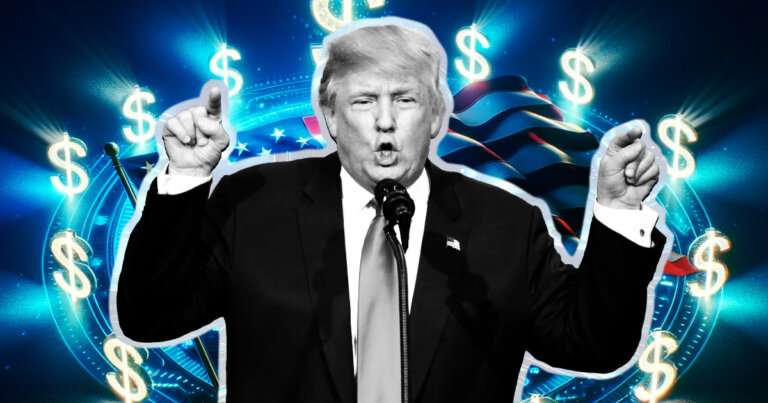 Trump pledges to block Central Bank Digital Currency if elected for second term
Trump pledges to block Central Bank Digital Currency if elected for second term Trump pledges to block Central Bank Digital Currency if elected for second term
CBDCs have become increasingly popular outside of the US, with many countries developing token pilots.

Gage Skidmore / CC BY-SA 2.0 / Wikimedia. Remixed by CryptoSlate
Former U.S. President Donald Trump vowed to prevent the introduction of a Central Bank Digital Currency (CBDC) if re-elected, according to a Jan. 17 speech in New Hampshire.
Trump vehemently opposed the idea of a CBDC, labeling the currency as a potential tool for government tyranny and a means for the government to exert complete control over individuals’ finances.
“I am also making another promise to protect Americans from government tyranny. As your president, I will never allow the creation of a Central Bank Digital Currency. Such a currency would give the federal government absolute control over your money. This would be a dangerous threat to freedom – and I will stop it from coming to America,” Trump said.
CBDC divides the U.S.
Perspectives about CBDCs diverge along partisan lines within the U.S. Democratic figures, such as Sen. Elizabeth Warren, champion the concept of these currencies, asserting that they hold the potential to address challenges within the banking sector.
Conversely, Republican legislators like Sen. Ted Cruz and Representative Tom Emmer staunchly oppose introducing a digital dollar.
Meanwhile, the Federal Reserve has remained skeptical about introducing the currency. Federal Reserve Governor Michelle Bowman recently argued that a CBDC could pose significant risks and tradeoffs for the financial system, including considerable consumer privacy concerns.
In addition, the financial regulator’s website clearly states that it has made no decision on issuing CBDCs and would only proceed with their issuance with an authorizing law.
Adoption grows abroad
Despite the U.S. government’s reluctance, several countries worldwide have been actively exploring this form of currency as an alternative to control the rising popularity of cryptocurrencies and stablecoins.
The Human Rights Foundation’s CBDC tracker reveals that over 100 countries, including the U.K., China, Nigeria, and Russia, are actively exploring and developing their CBDCs.
Morgan Stanley recently cautioned the potential impact of CBDC on the enduring supremacy of the U.S. dollar in the global economic landscape.
The financial institution posits that the proliferation of CBDCs can enhance the efficiency of cross-border transactions, thereby diminishing dependence on conventional financial intermediaries such as SWIFT.
Consequently, this evolution could reduce reliance on dominant currencies like the U.S. dollar.




























































